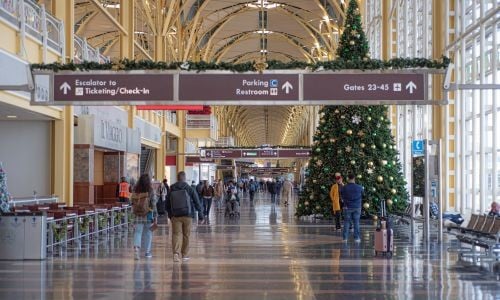
The holiday season is one of the busiest travel times of the year — and scammers know it. With millions on the move, the rush to book flights, hotels, and rentals can make travelers less cautious. Scammers take advantage by creating fake websites, posting fraudulent listings, and posing as legitimate booking agents.
Why Scammers Target Travelers
- Distraction and Stress: Holiday chaos makes people less cautious.
- Unfamiliar Territory: Travelers are often unaware of local risks or scams.
- Increased Spending: With gifts, bookings, and splurges, travelers are more financially exposed.
- Public Wi-Fi Use: Airports, hotels, and many local areas offer unsecured networks, ideal for cyber theft.
Fake Travel Websites
Scammers often create fake travel websites that look strikingly similar to legitimate ones. These sites can steal your personal information or payment details if you’re not careful.
How to Protect Yourself:
- Research the Company: Search the business name with keywords like “scam,” “review,” or “complaint” before sharing any personal information.
- Avoid Clicking Suspicious Links: If a deal arrives via email or text, go directly to the company’s official website to verify it.
- Check Payment Methods: Only use trusted methods like credit cards or secure digital wallets. Avoid wire transfers, gift cards, or cryptocurrency payments.
Airline and Hotel Booking Scams
Scammers pose as official booking agents or customer service reps using fake phone numbers or websites. Victims may arrive to find no booking exists, the rate has changed unexpectedly, or sensitive information has been stolen.
How to Protect Yourself:
- Verify Third-Party Agents: Only use official phone numbers or websites for bookings.
- Confirm Your Reservations: Double-check with the airline or hotel to ensure your booking exists.
- Protect Your Data: Never provide passport or credit card information unless you’re certain the source is legitimate.
Home and Car Rental Scams
Scammers often create fake listings, steal photos from legitimate properties, or offer unusually low rates to lure victims. Off-platform communication and unusual payment requests put travelers at risk.
How to Protect Yourself:
- Spot Fake Listings: Be cautious of listings that seem too good to be true or reuse photos from other sites.
- Use Official Platforms: Communicate and pay only through verified apps or websites.
- Beware Low-Cost Deals: Don’t prepay outside official channels for rentals or cars.
- Safe Payment Methods: Stick to credit cards or secure digital wallets; avoid wire transfers, direct bank transfers, or payment apps.
If you believe you’ve been targeted or victimized by a travel scam, report it immediately to the Federal Trade Commission (FTC). Prompt reporting helps protect you and others from further fraud.